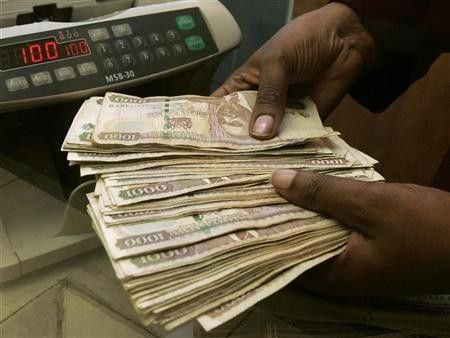Kenyan shilling creeps up vs dlr, stocks dip

The Kenyan shilling was barely moved against the dollar on Friday as traders squared positions but they said high oil prices were likely to stoke dollar demand and weigh on the local currency next week.
Shares on the Nairobi Stock Exchange's benchmark NSE-20 index fell for the second straight session as declines in Equity Bank and East African Breweries weighed on the bourse.
At 1300 GMT close of trade, commercial banks quoted the shilling at 81.00/10, marginally stronger than Thursday's closing rate of 81.05/15.
The local market has been very stable. The slight movement is because of position squaring ahead of the weekend, said Joyce Minjire, a trader at Commercial Bank of Africa.
Market players expected importer dollar appetite, in particular from crude oil importers, to fuel local demand for the U.S. currency towards the end of the month.
This (global oil price) will feed into the local currency. It means we pay higher for the same amount for oil, putting pressure on the shilling, Dickson Magecha, a trader at Standard Chartered Bank.
With a dry spell beginning in parts of the east African nation, traders are watching to see if the power sector will turn to thermal generation to make up for any shortfalls in hydro-generation.
More than 60 percent of the country's electricity is generated from dams that are filled by rainfall. A rise in thermal generation will result in higher imports of crude.
Tecchnical analysis showed shilling support at 81.20.
If the shilling breaks the 81.20 barrier, it may touch 81.50 unless we receive new market information, said Jackie Muchangi, a trader at Equity Bank.
The Nairobi Stock Exchange's benchmark NSE 20 share index fell to its lowest levels in 12 days, closing down 0.5 percent at 4514.59. However, the all-share index bounced back, gaining 0.08 percent to settle at 100.77 points.
Equity and EABL dragged down the index today owing to their large market capitalization, said Samuel Gichohi, an investment analyst at Standard Investment Bank.
There was little local activity, which is typical of January. We expect foreign activity to persist into next week, with a keen interest in the financial sector especially National Bank of Kenya (NBK) due to expected dividends, said Gichohi.
NBK will pay a full-year dividend for the first time in 14 years. Its share price closed up 2.73 percent at 47 shillings.
Kenya's leading mobile provider Safaricom gained for a third consecutive day, adding 1.15 percent to close at 4.40 shillings.
The share price fell from a two-month high of 4.80 shillings on January 14 after its main rival, Bharti Airtel's Kenyan unit cut its network charges.
Government bond activity fell this week to a total of 4.83 billion shillings compared with 5.74 billion last week.
© Copyright Thomson Reuters 2024. All rights reserved.





















